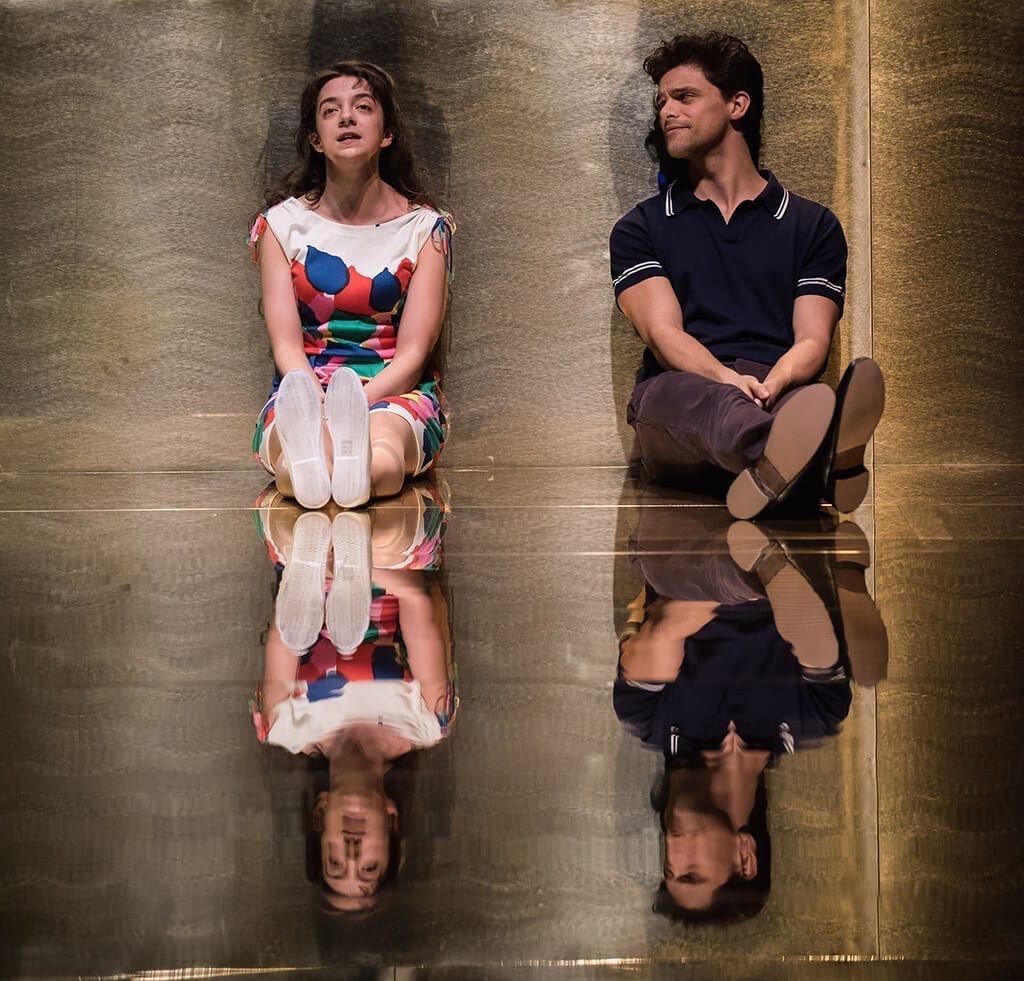Polly Findlay’s Merchant of Venice is a decidedly mixed bag, like the giant pendulum which swings at the back of the stage, it moves from the ridiculous to the sublime. Unfortunately, for the most part, these tonal shifts are stark and sometimes jarring.
Antonio stands on stage alone as the audience file in— earnestly sad and visibly weeping; soon we realise the subject of his grief: love (both requited and unrequited) for Bassanio. At one moment, early in the play, they share a passionate kiss which conjures a low gasp from the audience.
It is an opening which emphasises love and earnestness. Swiftly, however, the play shifts and settles into its default mode: broad comedy. It is the smaller roles, all of which are strongly characterised, that provide this comedy. Unfortunately, this tends to distract from the narrative focus, in particular, Shylock’s centrality.
Nevertheless, the actors should be commended for mining Shakespeare’s text for new comic significance, and imbuing it with the rhythms of ordinary speech. Jacob Fortune-Lloyd, as Bassanio, in particular, breaks from the iambic verse to provide clever new emphases. Of the other characters, Tim Samuels’ Launcelot Gobbo is played as a cynical and knowing clown, not the malapropism-spouting buffoon he is sometimes portrayed as. In fact, Gobbo brought an anarchic spirit to the production, even if it was still well within conservative RSC bounds.
Findlay’s emphasis on the play’s comic centre also resolves another of Merchant’s bizarre subplots, namely, the courtship casket scenes. Whereas I had always imagined these scenes as an incongruous fairytale, here they are played mostly for laughs. Brian Prothero, in particular, had a funny cameo as the preening Prince of Aragon. The overt comedy of these sections tonally synthesised them with the rest of the play in a way that I hadn’t formerly thought possible. When it comes to Bassanio’s conjugal choice, Portia gestures very obviously to the correct lead casket; it is a nice moment which again disarms the possible fairytale serendipity.
Still, moving from these comic moments to the Venetians’ virulent abuse of Shylock, proves difficult. Makram Khoury gives a solid performance as Shylock, even when his ‘Hath not a Jew…’ speech primarily served to remind the audience how small a presence he was in the play. Mostly then, the comic ‘playing’ tended to reduce the Merchant’s tragedy and left the performance feeling hollow. By the time the interval came around, the play’s flaws, dramatic contrivances, lack of a focal point and messy bifurcated narrative structure were all obvious. Were these examples of Shakespeare’s genius problem play or bad writing? The present production made me suspect the latter.
All these problems were forgiven, however, with the arrival of the trial scene. Staged in clear and dramatic fashion with a bravura performance from Patsy Ferran as Portia, the trial was by far the evening’s highlight. Jamie Ballard’s nasal and moaning Antonio was suddenly in the perfect context to flourish. Far from being a stoic calmly awaiting his demise, Ballard played Antonio with an exhilarating realism: coughing, retching, spluttering, weeping and exclaiming with pure fear. It brought home the terror of a man awaiting painful execution, and offered a stark contemporary parallel to the recent ISIS executions. The scene was a revelation.
My faith in Shakespeare and the production suddenly restored, other aspects of the play began to fall into place. The up-till then ill fitting David Lang-esque choral singing suddenly became an evocation of Portia and Nerissa’s monastic setting and of play’s Venetian Christianity; the pendulum which had swung from the back of the stage from the play’s start, had now poetically slowed to an almost complete stop. And, then, the same pendulum became an eerie moon to accompany Jessica and Lorenzo’s final lyric encounter.
All in all: a difficult production to judge (especially as many of the flaws are in inherent in the play) but it was redeemed by a outstanding final forty-five minutes

